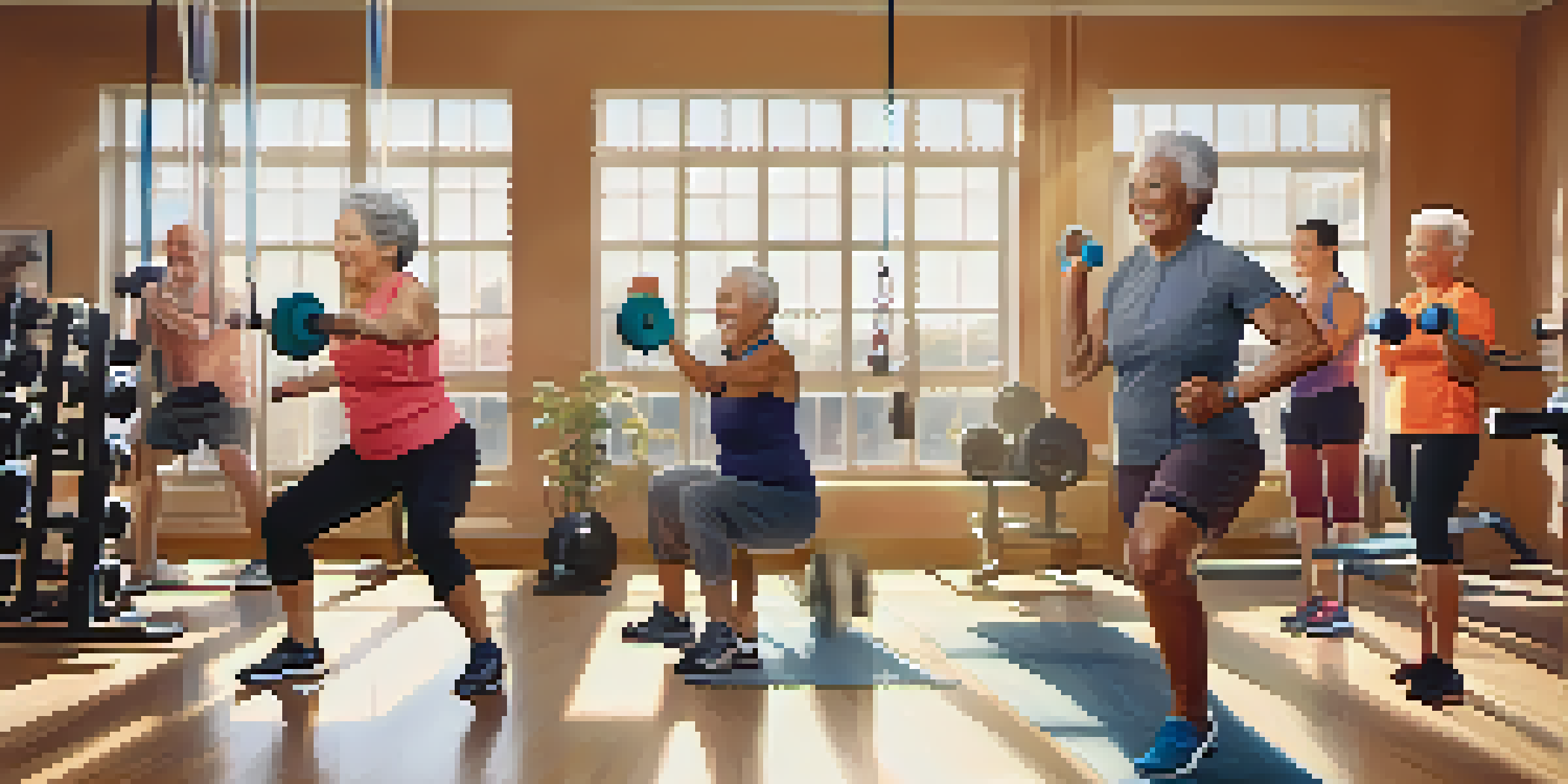Addressing Common Myths About Bodybuilding and Aging

Myth 1: Bodybuilding is Only for Young People
One of the most prevalent myths about bodybuilding is that it's an activity reserved solely for the young. This misconception can deter older adults from engaging in strength training, which is essential for maintaining muscle mass and overall health as we age.
Strength training is a vital part of a healthy lifestyle, regardless of age.
In reality, bodybuilding can be beneficial at any age. Many seasoned bodybuilders have shown that with the right approach, including proper nutrition and recovery, anyone can reap the rewards of strength training, regardless of their age.
Moreover, adopting a bodybuilding routine can help improve mobility, bone density, and even mental health, making it a great fit for individuals looking to stay fit and vibrant in their later years.
Myth 2: Lifting Weights Will Make You Bulky
Another common misconception is that lifting weights will automatically lead to unwanted bulk. Many people fear that they’ll end up looking like professional bodybuilders, which can be intimidating and discouraging.

However, the truth is that building significant muscle mass requires a specific diet and rigorous training regimen that most casual lifters don’t follow. For most people, weightlifting helps tone and strengthen muscles without excessive bulk.
Bodybuilding is for All Ages
Strength training benefits individuals of all ages, improving mobility and health as we age.
In fact, strength training can enhance your overall physique and help you achieve a leaner appearance, making it an ideal option for those wanting to maintain a fit and healthy body as they age.
Myth 3: Older Adults Should Avoid Strength Training
It's a common belief that older adults should avoid strength training to prevent injury. While it's true that safety is a priority, avoiding weightlifting altogether can lead to more harm than good as it may accelerate muscle loss and weaken bones.
Bodybuilding is not just about physical strength; it’s about mental resilience and personal growth.
In fact, engaging in strength training can significantly reduce the risk of falls and injuries, improving balance and coordination. With proper guidance and a tailored program, older adults can safely incorporate weightlifting into their fitness routine.
Both physical therapists and fitness experts agree that strength training is crucial for maintaining independence and quality of life as we age.
Myth 4: You Need to Be Fit to Start Bodybuilding
Many believe that you need to be already fit before starting bodybuilding, but this couldn’t be further from the truth. Bodybuilding is a journey that can accommodate individuals at all fitness levels, including beginners.
Starting with a basic routine allows you to gradually build strength while learning proper techniques. This progressive approach not only prevents injury but also helps you stay motivated as you see improvements.
Lifting Weights Won't Make You Bulky
Weightlifting helps tone muscles without excessive bulk, making it ideal for achieving a leaner physique.
Ultimately, everyone’s starting point is different, and it’s perfectly okay to begin wherever you are. The key is to stay consistent and committed to your goals.
Myth 5: Bodybuilding Requires Expensive Supplements
The idea that bodybuilding necessitates expensive supplements is another myth that can discourage many from pursuing their fitness goals. While the supplement industry is vast, the truth is that most people can achieve their goals through a balanced diet and proper training.
Focus on whole foods rich in protein, healthy fats, and carbohydrates to fuel your workouts and recovery. Foods like lean meats, dairy, legumes, and whole grains can provide all the nutrition you need.
Supplements can be helpful in certain situations, but they should never replace a well-rounded diet. Many successful bodybuilders rely primarily on food, proving that effective bodybuilding doesn’t have to break the bank.
Myth 6: Bodybuilding is Time-Consuming
Another myth is that bodybuilding requires an immense time commitment, which can be discouraging for those with busy lives. The truth is, you can achieve great results with just a few hours of dedicated training each week.
Quality often trumps quantity when it comes to workouts. Focusing on efficient training sessions that target all major muscle groups can yield significant benefits without needing to spend hours in the gym.
Bodybuilding is More Than Strength
Beyond physical benefits, bodybuilding boosts mental health and confidence, enhancing overall well-being.
Additionally, with effective planning and prioritization, you can seamlessly incorporate bodybuilding into your routine, making it a sustainable part of your lifestyle.
Myth 7: Bodybuilding is Only About Physical Strength
While physical strength is certainly a component of bodybuilding, many overlook the mental benefits it provides. Bodybuilding can boost confidence, improve mental health, and foster a sense of accomplishment as you reach your goals.
Setting and achieving fitness milestones can create a positive ripple effect in other areas of life, enhancing motivation and resilience. This holistic approach to fitness is often overlooked, yet it’s just as vital as the physical aspects.

Moreover, the discipline and focus required for bodybuilding can translate into improved performance in professional and personal pursuits, making it a well-rounded endeavor.
Myth 8: Bodybuilding is Only for Competitive Athletes
Many people equate bodybuilding solely with competition, believing it's an activity reserved for elite athletes. In reality, bodybuilding is for everyone, whether you're looking to compete or simply improve your health and fitness.
The essence of bodybuilding is about building strength, muscle, and confidence, which can be achieved through personal goals and self-improvement. You don’t need to step on a stage to reap the benefits of strength training.
Embracing bodybuilding as a lifestyle can lead to better overall health, increased energy, and a more fulfilling life, regardless of whether you ever compete.